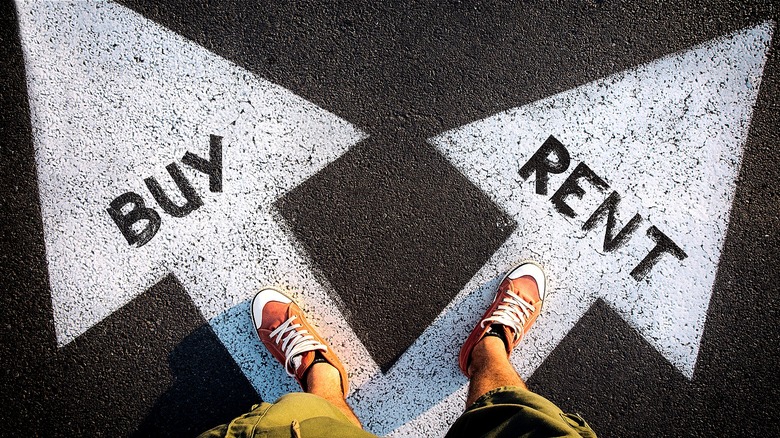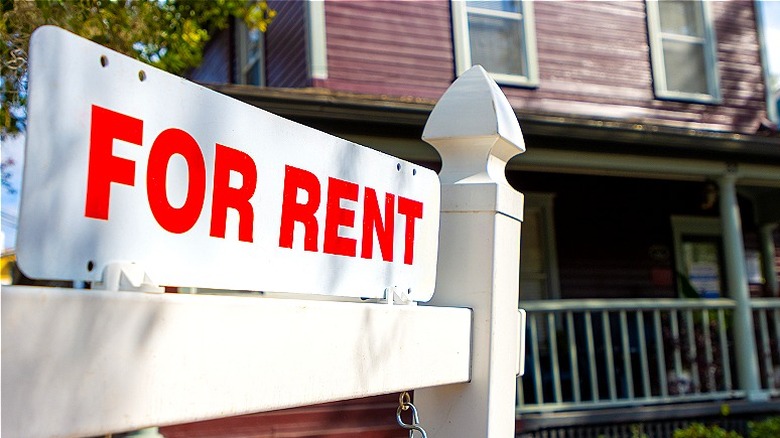Renting Vs. Owning: Both Can Help You Build Wealth, According To A Personal Finance Expert
Despite the general thought that renters are losing money compared to building equity through purchasing a home, you might be surprised to learn that renting can also allow you to build wealth. Thanks to high-interest rates, a result of the Federal Reserve's attempts to curb rising inflation (and achieve a soft landing for the economy), prospective homebuyers could be facing higher monthly mortgage payments in addition to larger total loan amounts. As of May 2024, the national average for a 30-year fixed mortgage was 7.19%. This increase in both immediate and long-term prices has either convinced or forced many Americans to avoid buying a home for the foreseeable future. What's more, this can be especially off-putting for first-time homebuyers.
Yet, even with higher interest rates, the question of if it's more financially sound to rent or buy has become decidedly more complicated in the last several years. As renters already know, rental prices have increased significantly in the post-pandemic housing market. In fact, home-rental prices are 30% higher than they were before the pandemic, and while rental prices have technically slowed compared to 2021, as of March 2024, prices were up 3.6% compared to March 2023.
This begs the question of if renting with the increase in prices is the better option compared to homebuying with its increased interest rates. Which of the two helps build wealth more? Turns out, the answer could depend largely on your specific geographic market. To learn more, we spoke with Jason Tartick, bestselling author, finance expert, and podcast host, about this topic — specifically, how renting can, in some cases, prove a better option than buying in today's housing market.
Price-to-rent ratios explained
One of the first things to understand about comparing the financial consequences of renting versus buying is price ratios. According to Jason Tartick, "There is something that we call the price-to-rent ratio. It will give you [a] benchmark for estimating ... whether it is cheaper to rent or actually own a property outright. It's all going to be based on where you live, but it's going to be the median annual rent divided by the median home price. That number will tell you how many years you would be renting for until you own the price based on the rent."
While that might sound a bit complicated, it can give you a general sense of if the monthly rent you're paying is still a better financial deal than the prospect of a mortgage payment. This rent ratio can also help determine if your housing market is fairly valued, or if it's experiencing a housing bubble. (See what your mortgage payment should be based on your monthly income.)
According to Rent.com, the national median monthly rental price was $1,987, as of March 2024, while the median home price was $393,500 for the same month and year, according to the National Association of Realtors. If we use these averages, you can divide $393,500 by the annual average rent ($1,987 x 12 = $23,844), which would be 16.5. Tartick explained what this number means, "If it's a price-to-rent ratio of 16 to 20, that indicates it might be better to rent than buy. If the price-to-rent ratio is over 20, they say then you should absolutely rent, not buy."
When is it better to buy?
Jason Tartick explained the flip side of this ratio, "What they say is the ratio of one to 15 would be saying, in that area, you should buy." It's also worth noting that while price-to-rent ratios can help you calculate comparisons, they can also miss certain factors associated with purchasing a home. For starters, given the steady increase in rent prices, any calculation done in 2024 might soon change or be entirely irreverent as rents continue to rise.
This factor is particularly important when calculating long-term financial comparisons. While some states (e.g., California) have implemented rental price increase caps, other states lack legislation that would help renters avoid significant increases to their rent prices. This lack of a price guarantee can add additional stress for families living with strict budgets.
It's also worth mentioning that each geographic region will have fundamentally different ratios, so understanding the market in a specific place can be the key to knowing if it's better to buy or rent in that area, and which will ultimately help you build your wealth. Some cities can have more steady pricing as opposed to hot markets.
Other considerations can include the ability to have pets, and the freedom to change or customize your space without worrying about security deposits. Ultimately, there are benefits and downsides to both renting or buying, but interest rates could change the age-old idea that buying is fundamentally better. Tartick's takeaway? "With the cost of housing right now, we are seeing many people being in a better position based on renting than buying."


